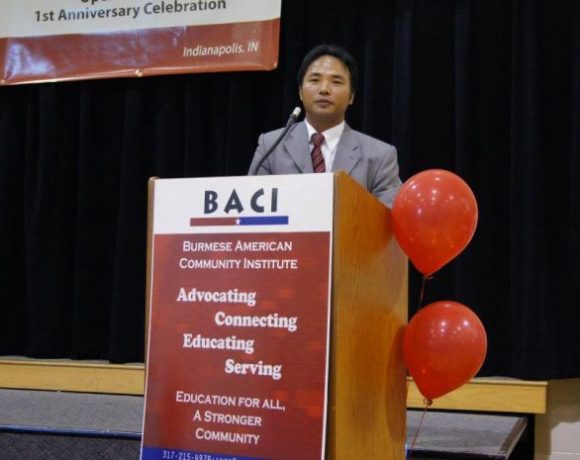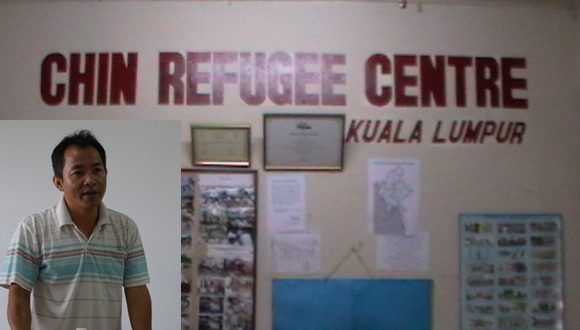Burma: “The Time Has Come”: Interview With Veteran Activist Salai Kipp Kho Lian
28 September 2007 Hamburg, Germany [CG Note:As the anti junta demonstration in Burma turned ugly, and the eye of the world is on Burma , the Chinland Guardian interview several veteran activists and present their views to the readers regarding present situation in Burma . We have the honor to present the views of a veteran series starting with Salai Kipp Kho Lian.
Salai Kipp Kho Lian, Coordinator of the CHIN FORUM, was a student political activist during the 1970s while he was studying Architecture at the Rangoon Institute of Technology. He was arrested and locked up for 13 months in the notorious Insein Jail from Dec. 1972 to Jan 1974 for being a signatory of “The Proposal of Chin Youth”, advocating democracy and federalism in response to the military regime’s call for submission of advices for a new constitution to be promulgated.
He was again arrested, along with thousands of students, in Dec 1974 inside the Rangoon University Campus for taking part in the student strike demanding Mausoleum for U Thant, the former General Secretary of the United Nations when he died in the US and his remains were flown back to Burma . He took part actively in organizing the Thakhin Ko Daw Hmaing centennial strike in 1976. In the end the military government expelled him from the University for life.
Chinland Guardian: As a veteran political activist involving in mass movements in Burma during the 70s, you must be very excited looking at current political development in Burma.?
Salai Kipp: Mass uprisings or the people’s show of overwhelming power took place at an average of once a decade in Burma ‘s forty five years of history under dictators. The military has been running the country with an iron-grip like an occupying force for a long time and mass defiant against the regime seems to be next to impossible. Sun Tzu said: ….. “the opportunity of defeating the enemy is provided by the enemy himself”. Careful analysis shows a classic example of this maxim proving to be true in Burma . or example:-
– During the 1973 referendum, the general masses overwhelmingly voted “no” to the military’s constitution and the military promulgated it anyway. This paved the way for more political turmoil in the years ahead. At that time it was the military that provided the people to be able to unitedly oppose them;
Again In 1974 the general masses unitedly gave full supports to the student-demonstrato rs’ demand for a mausoleum for the former UN General Secretary U Thant, who died in New York and his remains brought back to the country. This uprising was made possible by the military when they show their disrespect to such a great son of Burma and decided , against the wishes of the people, to bury U Thant’s body at an ordinary cemetery without any honour, like mausoleum. The military finally yielded and U Thant mausoleum was erected;
-In 1988 the general masses raised up and totally abolished General Ne Win’s socialist party. Three dictators, including General Ne Wim himself, resigned in one single month and the military finally staged a self-coup, dashing all hopes for change. This 1988 peoples power uprising was made possible by the dictators: at that time extreme hardships was faced by the people as their hard earned money were made worhtless when General Ne Win demonetised all Burmese currency in 1987 without any compensation. Being outrageous as such, the people of Burma were already in a ready-mode for any mass defiance;
-During the 1990 general election, sponsored by the military regime, the general masses took the opportunity again and gave the opposition National League for Democracy a landslide victory.
Despite the differences in time and causes the similarity with the past events is there: now the dictators are once again providing the opportunity for the people to rise up by suddenly hiking fuel prices when the majority of the people are already living under extreme poverty.
Chinland Guardian: Isn’t it an irony when you say the military regime give the people such an opportunity to oppose them while on the other hand they always ruled with iron-grip showing no sign of tolerance to any kind of defiance?
Salai Kipp: Powerful mass uprisings or the people’s show of power that almost paralyzed the dictators occurred in Burma whenever the dictators become complacent and overly confident. Yes, that itself is an irony. If you look carefully to each of the events unfolding the military acted in confidence as if their power over the people is absolute. However, at such moments the military’s lack of complete power they thought they had over the people has been exposed by the masses again and again throughout our past history. For example, when the recent fuel price hiking was met by students-led protest the military regime responded by pitching them with their own supporters – civilian thugs. They intended to calm down the protests this way. Contrary to the military regime’s intention, the protest become even bigger as the Buddhist monks were compelled to take the leadership. Again, by the time the military ordered curfew and started to crack down on the peaceful demonstrations with the intention of calming down the protest the crowd even grew larger (from 100,000 to 300,000) , not smaller as intended. It is “the law of unintended consequences” taking its hold, so to say.
Chinland Guardian: Do you think it is proper for the Buddhist monk to take the street, protesting the government?
Salai Kipp: It was U Ottama, a Buddhist monk from Rakhine State , who started street protests during the colonial period. Another Buddhist monk, U Wizzara was a well know martyr of Burma ‘s struggle for Independence . So the invlovement of monks in Burma ‘s politics is not new. They are always at the forefront of our struggle for freedom and in a way they are the nation’s conscience.
Chinland Guardian: The SPDC is using force and announcing curfew now. What can happen next?
Salai Kipp: As said already, so far the curfew has not stopped the demonstrations. But it provokes even more people to join. We cannot definitely say what will happen next. We all know from deep inside our hearts that this is the final showdown between the people and the dictators. If the struggle back down this time we may never have this kind of chance again for 20 to 30 years and our country will be totally ruined under this regime. So it is to be hoped that the struggle will go on until we achieve total victory.
Chinland Guardian: What should the activists and political parties from abroad do in a situation like this?
Salai Kipp: There are a lot of things we could do from outside: Giving interviews with local news media, including TV and radio stations and news papers, signing petitions for the UN intervention, collecting and sending money for the monks inside the country, organizing demonstrations in front of the Chinese Embassies world wide, lobbying with the international communities like the US, ASEAN, EU, UN for tougher warnings and practical actions against the regime etc.
Apart from that I would like to urge all Chin Churches around the world to openly declare their supports to the mass uprisings lead by the Buddhist monks and collect and send donations for the struggle inside Burma.
Chinland Guardian: Is there any thing you would like to say?
Salai Kipp: One important fact is, nowadays the ever increaisngly racist SPDC regime no more promote chrisitan Chin soldiers to higher ranks. So the Chin youth are no more interested to join the Army since 1988. And at the same time the Chin youth are very clever and intelligent and very much globalized. In response to the military regime’s persecution and hardships and sufferings imposed upon them, the Chin youth are leaving behind their beloved land temporarily in the thousands to study political science, economics, theology etc. in the western countries. At this very moment there are already about 500 Chin students in the universities in the western world and the number is increasing.This make the racist military regime very nervous. If we are to expect the successive Burmese governments to grant us state scholarships to study abroad, less than 10 Chin students will have the chance to get it in ten years! So this is another “unintended consequences” of the SPDC regime the mass Chin exodus is creating. This is part of our Chin revolution – the knowledge revolution.
Chinland Guardian: Thank you very much.





